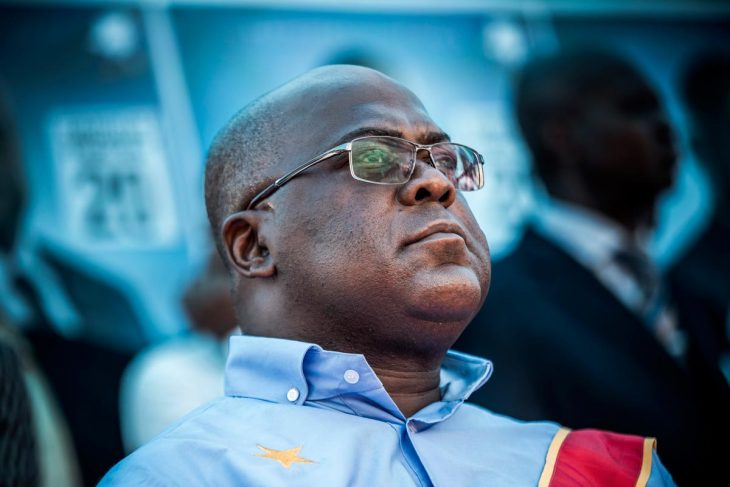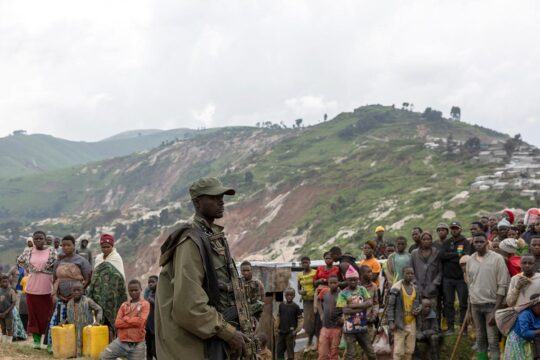Since August 2016, Kasai region in central Democratic Republic of Congo (DRC) has been the scene of violence perpetrated by militias and elements of the security forces, with killings of civilians, mutilations, rapes and other forms of sexual violence, entire villages destroyed and massive population displacements.
For the commune of Nganza, in central Kasai, the worst ordeal was in March 2017, when members of the defence and security forces launched a "door-to-door operation". For several days, soldiers and police fired live ammunition, killing men, women and children, according to some 400 survivors in an open letter dated August 12. "The bodies were either buried in mass graves, other grave sites, or brought to unknown destinations," say the survivors who belong to the "I am Nganza, I demand justice" association. "The military officers, soldiers and police who committed these crimes were transferred and redeployed elsewhere," continue the signatories of this letter addressed to President Felix Tshisekedi, who comes from Kasai. It was received by his cabinet on August 19. The investigation opened by the military justice system "has not made significant progress", the signatories say.
Fruitless ICC appeal
They call on the Head of State to "set up a mechanism to assist them in their socio-economic situation", to "provide justice in the Kasai region with human, material, financial, technical, logistical and operational resources so that the perpetrators of these heinous crimes can be held criminally responsible and the victims can obtain fair compensation". Failing this, they call on the president to "refer the situation of Kasai in general and that of the commune of Nganza in particular to the International Criminal Court" (ICC). Joseph Kabila, Félix Tshisekedi's predecessor, had rejected this proposal.
UN experts who went to Kasai in 2017 concluded in a July 2018 report to the Human Rights Council that some of these crimes constituted war crimes or crimes against humanity. In a statement on March 31, 2017, ICC Prosecutor Fatou Bensouda said her office “continues to carefully monitor the situation throughout the Congolese territory, including the current situation in the Kasaï provinces”. She urged the Congolese authorities to “take all measures required to conduct genuine investigations so as to shed light on the alleged acts of violence and bring to justice those involved in perpetrating the criminal acts documented in the Kasai provinces”.
Double standards
But more than two years after this call, the only trials progressing are those of suspects in the March 2017 murder of two UN experts, the Swedish-Chilean Zaïda Catalan and the American Michael Sharp. "This is a double standard of justice," says Kasai Central barrister Dominique Kambala Nkongolo in an interview with JusticeInfo. Kambala, who heads a collective of victims' lawyers, stresses the gravity the crimes and is campaigning for a referral to the ICC.
"Congolese justice cannot conduct impartial trials in the case of the violence in Kasai," said Jean-Claude Katende, president of the African Association for Human Rights (ASADHO), a Congolese civil society organization that has conducted extensive investigations in Kasai. Expressing an opinion shared by independent observers, Katende says the Congolese courts "are only interested in small fry while the high political and military sponsors of these crimes remain at large". According to the human rights activist, "there is no judicial institution in the DRC that dares to try high-ranking military officials, but direct perpetrators of these crimes must have received orders from above. Some of the militias who perpetrated the crimes were armed and trained by the army and police. We have a justice system that cannot try everyone, but if we really want to heal the country of violence, we must prosecute all the suspects, whoever they are. If justice is to be done in Kasai, the situation must be referred to the International Criminal Court".
Beyond criminal justice
And this criminal justice will not be enough, warns Katende. As well as trials before independent judges there should be an “open, public debate, particularly to listen to the victims”, he says.
In September 2017, Kabila organized a "conference on peace, reconciliation and development in Kasai" in Kananga, with the objective of "bringing all concerned together to discuss the crisis" and end the cycle of violence. The meeting clearly disappointed the people of Kasai. "We can say that it was a charade for which the State paid huge sums,” says Josephine Bitota Muamba, Rector of the University of Notre Dame du Kasai. “This conference was largely facilitated by experts from elsewhere with preconceived theories, rather than people on the ground who could, based on their experience, bring important elements to peacebuilding in Kasai.” Speaking at a workshop organized in April by the UN High Commissioner for Human Rights, Josephine Bitota Muamba deplored the repetition of patterns that have proved devastating in other parts of the country, particularly the east. "By giving donations and money to some militia leaders in Kasai, the authorities have provoked a situation where other militia leaders feel aggrieved and are willing to use arms to get the same favours," she said. Advocating for a new conference, she suggested "going to the villages to talk with people and listen to their demands and grievances”.
ORIGINS OF THE CONFLICT IN KASAÏ
Kamuina Nsapu is a name much associated with the crisis in Kasai. Kamuina Nsapu is the honorary title of the chief of the Bajila Kasanga, a clan of the Lulua tribe in Kasai Central Province.
In November 2011, Jean-Pierre Mpandi, a member of the clan, was chosen as Kamuina Nsapu. But the provincial authorities refused to recognize him. The outraged traditional chief, with the backing of his clan, refused in turn to recognize the provincial authorities or the central government of President Joseph Kabila. On August 12, 2016, this self-declared opponent of the Kabila regime was killed by a bullet in the stomach during an operation by the security forces. To avenge their chief, militia now dubbed “Kamuina Nsapu” torched administrative buildings, attacked and killed soldiers, policemen and other representatives of the central government. The violence spread, as many young people lent their support.
Most Kamuina Nsapu militiamen are minors armed with locally made rifles, traditional weapons and protective charms. Very quickly, the conflict took on an inter-ethnic connotation. Indeed, in their reprisals, the defence and security forces were relying on another militia, the Bana Mura, composed of members of the Chokwe, Pende and Tetela ethnic groups.
Clashes between Kamuina Nsapu militiamen and Bana Mura security forces and militias left more than 3,000 people dead and 1.4 million displaced between 2016 and 2017, according to the United Nations. According to the latest UN expert report, violence in Kasai has decreased considerably since Tshisekedi's election as president. But enslavement of women and children by Bana Mura militiamen persists in some parts of the region.







